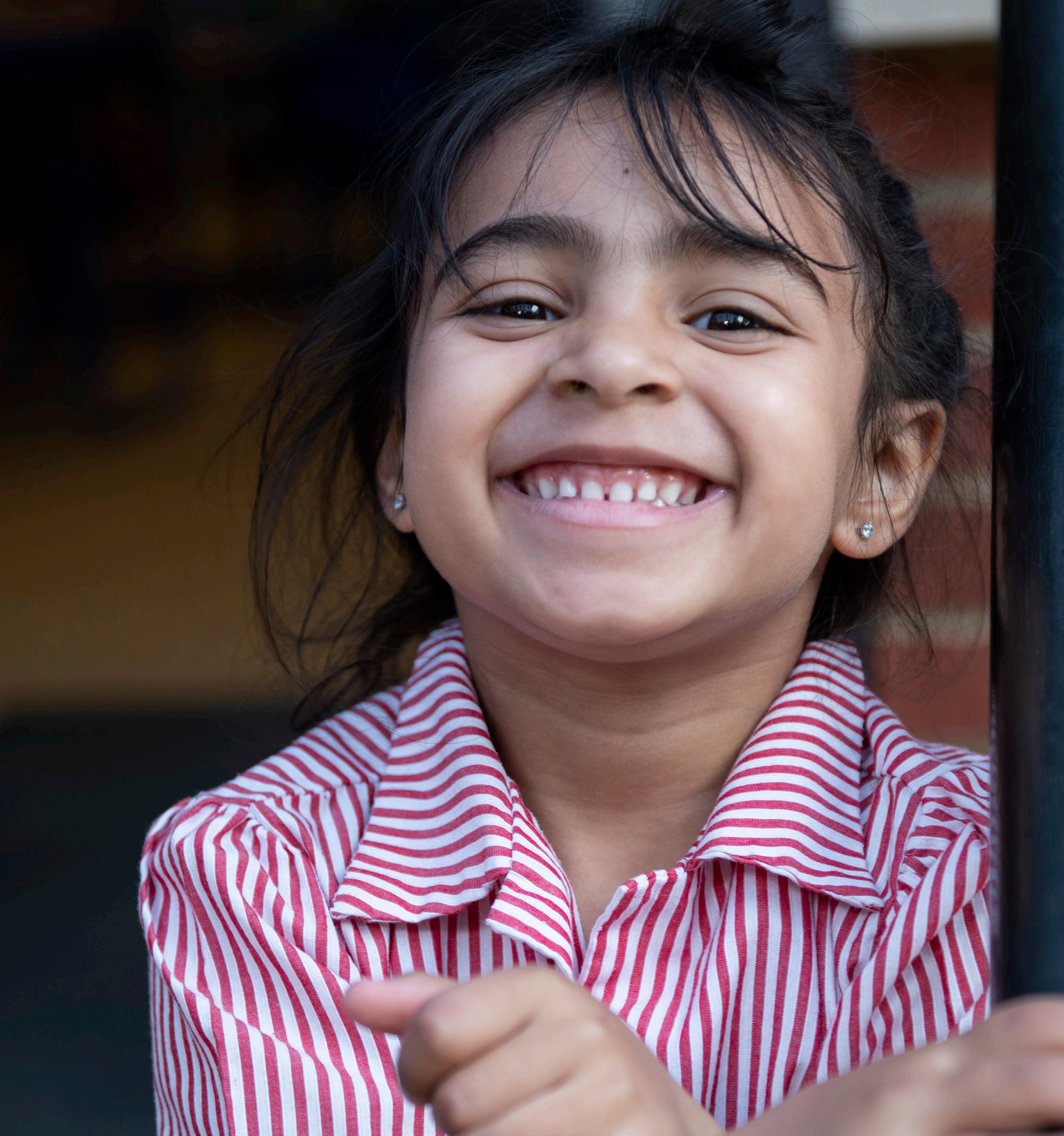

LOWER SCHOOL AT RSM
(RECEPTION–YEAR 2)


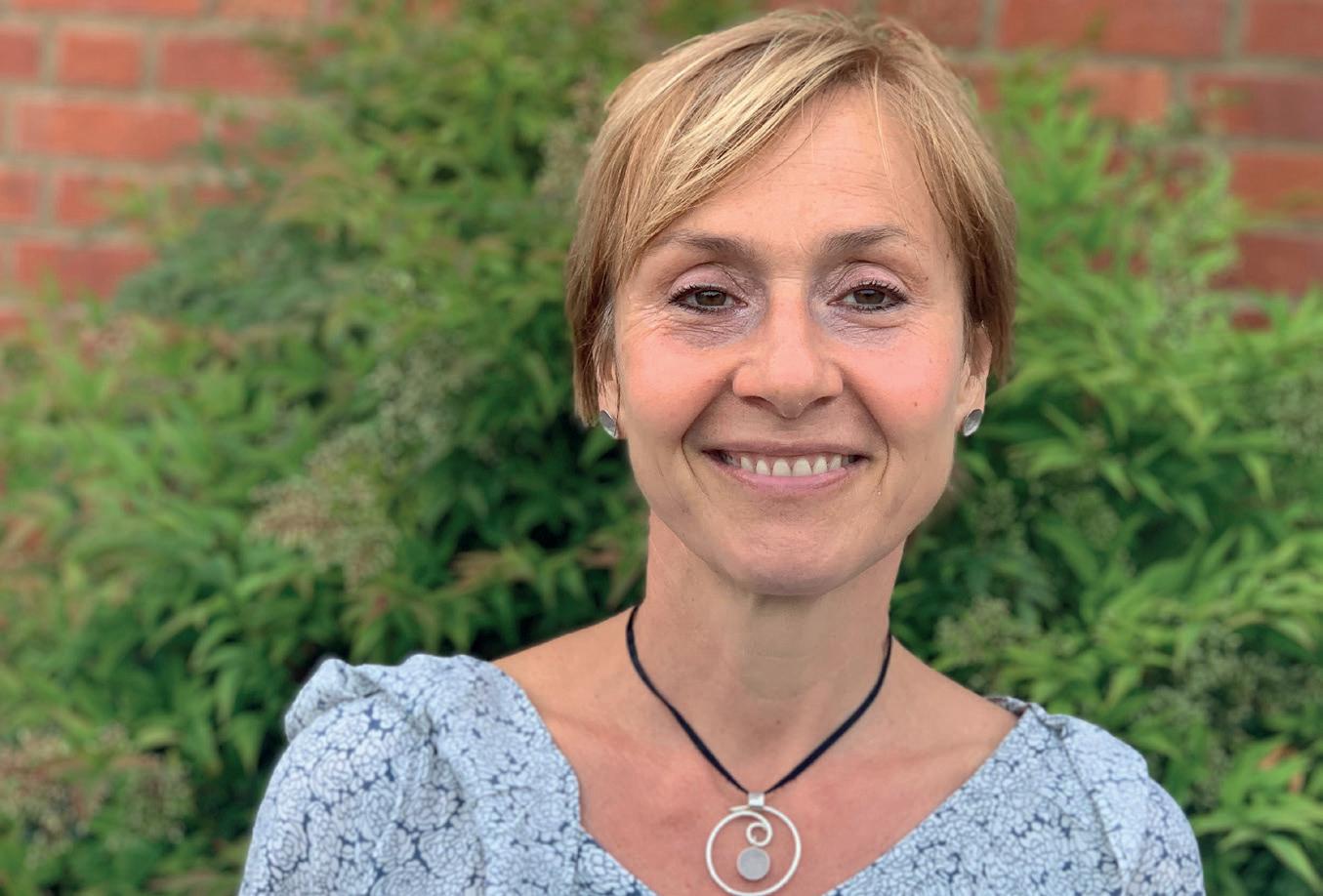
FROM THE HEAD OF LOWER SCHOOL
At Reigate St Mary’s, we want children to be happy, confident and resilient young people who believe in themselves and are not afraid to think big. We achieve this by building meaningful relationships with them from the very beginning of their time with us. These relationships enable us to provide highly differentiated learning and gentle stretch or support when needed. This, alongside a growth mind-set approach to learning and a focus on developing thinking skills, mean the children are not afraid to try new things and to turn mistakes into valuable learning opportunities. The result? Happy, confident children engaged in deep learning.
Small class sizes, excellent ratios and specialist staff give a boost to the pace of learning and our curriculum goes well beyond the national framework. A breadth of subjects, plenty of creativity and a focus on problem solving are delivered in exciting lessons that spark the children’s natural curiosity and imagination.
Technology is firmly at the centre of learning throughout the school, being embedded into the structure of lessons, and our wonderful site and facilities mean the children have plenty of fresh air and green spaces to explore. Excellent wraparound care and a diverse extracurricular programme give families plenty of options at the beginning and end of each day and throughout the holidays too.
I hope you find the information in this booklet useful and I would be delighted to talk to you further in person about the Lower School at RSM.
Sam Selkirk Head of Lower School
THE SCHOOL STRUCTURE
We educate children from the age of 2½ to 11 years old. To ensure the very best education and support, the school has a Lower and Upper School structure:
Green Shoots
From 2½ years. Children join in September or January and are therefore with us in Green Shoots for two or three terms, depending on their birth month.
Early
Years
Kindergarten
The pre-school year. Children move up from Green Shoots into Kindergarten or join Kindergarten directly in the September before they turn 4 years old.
Reception
The first year of ‘big’ school. Children move up from Kindergarten or join Reception directly in the September before they turn 5 years old.
Key Stage 1 Years 1&2
Children move up from Reception. Occasionally, places become available for direct entry into these year groups.
Key Stage 2 Years 3–6
Full details can be found in our Upper School at RSM brochure – contact Jenny Myddleton for a copy.
This booklet has information on Reception (the last year of Early Years and the first year of ‘big’ school), Year 1 and Year 2. Information on Green Shoots and Kindergarten can be found in our separate Early Years booklet.
“There’s
a warm-hearted feel to the school and an overwhelming sense that community and relationships are at the heart of it.”
Muddy Stilettos
Lower School
Upper School
Most children in Kindergarten move up to our Reception classes and they are joined by up to 10 children from other settings. This makes a year group of 44 children, divided into three classes (two of 15 and one of 14). The transition tends to be easy and seamless and it is very much a fresh start for everyone.

At the end of Reception, the 3 classes become 2 for Year 1 and beyond (with a maximum class size of 22). The children quickly settle in with their new mix of classmates.

By the end of Year 2, children are academically and emotionally ready to move up to Year 3 in the Upper School, with firm academic and pastoral foundations giving them the confidence to grasp the challenges of Key Stage 2 and beyond.
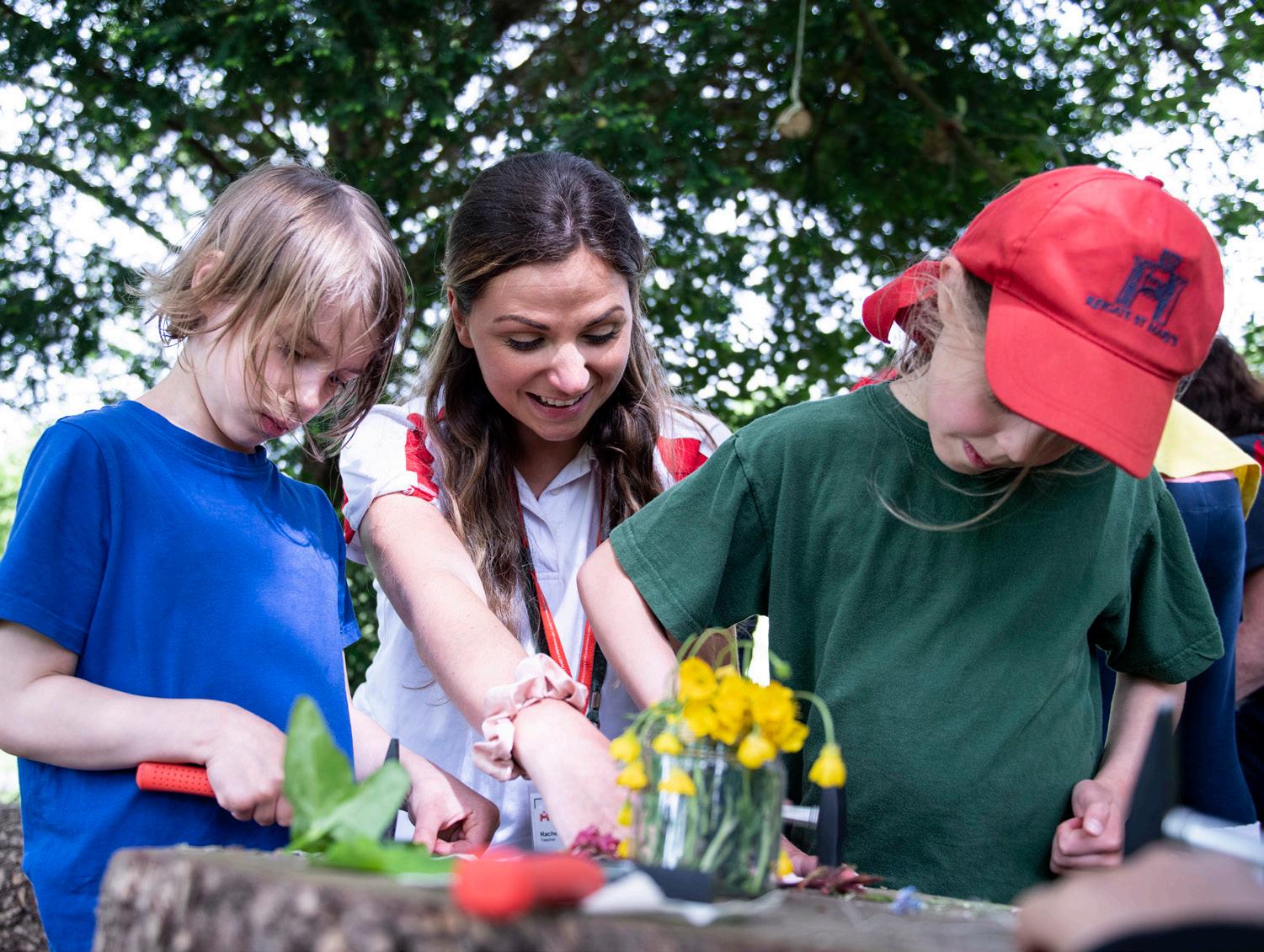
THINKING SKILLS IN LOWER SCHOOL
“Education is not the learning of facts, it’s rather the training of the mind to think.”
Albert Einstein
“A child’s experiences during their early years provide the essential foundations for life. Their development during this period influences their basic learning, educational attainment, economic participation and health.”
The EYFS Review – Report on the Evidence 2011
“Pupils are confident, curious learners who are encouraged to be creative and take risks with their learning”
ISI Inspection Report 2023
We know that children need to develop robust thinking skills from the very beginning of their education, as these form essential foundations for successful learning in the future. Thinking skills enable all of us to process information, recall facts and apply knowledge to various situations. Building and strengthening these skills lies at the heart of teaching throughout Lower School at RSM.
WHY ARE THINKING SKILLS IMPORTANT AT THE BEGINNING OF A CHILD’S EDUCATION?
In the twentieth century, education was based on the idea that some children could naturally learn and think better than others. Teaching involved disseminating chunks of information which children learnt by rote and were later tested on to check their progress. Over the past 30 years, research by cognitive scientists and developmental psychologists has dispelled the myth that intelligence is static. We now know that the development of robust thinking skills through enquiry-based learning and problem solving from the very beginning of a child’s life, is fundamental to their future educational success.
CHARACTERISTICS OF EFFECTIVE LEARNING
At RSM, we cultivate the children’s thinking skills by helping them to acquire Characteristics of Effective Learning (CofEL). We have friendly characters that help to embed these and give the children confidence to try new things. This sets them firmly on the path to becoming independent learners.
The Characteristics of Effective Learning are:
• Playing & Exploring – show curiosity and flexibility of thought. Take risks and not be fearful of making mistakes. Our friendly character is Have a Go Hippo.
• Active Learning – show high levels of fascination, bounce back from difficulties and be intrinsically motivated to accomplish something. Our friendly character is Busy Bee.
• Creative & Critical Thinking – solve problems, notice patterns, make predictions and change strategy if necessary.
• Reflection & Evaluation In Years 1&2 we introduce a further characteristic: - reflecting and reviewing work. We talk to the children about what they would do differently next time and why. Our friendly character is Reflective Rhino.
INDEPENDENCE
Independence is a crucial part of learning. When children are independent, they become more confident, learn to persevere, problem solve and generally have a go.
WELLBEING
We want children to feel loved and to know how to love others. It is belonging and relating to others that fosters self-esteem, brings happiness and makes a life worth living. Without these cornerstones of wellbeing, a child’s potential will never be fully realised. Everything else hinges on it.
At RSM, we recognise that children learn best when they are happy. Strong, positive relationships mean our children feel secure and loved. Expressing emotions is an important part of wellbeing and we support children to do this through stories and puppets, calming visual toys like oil timers or sometimes a cuddle. We encourage the children to work together, to be kind and to support each other.
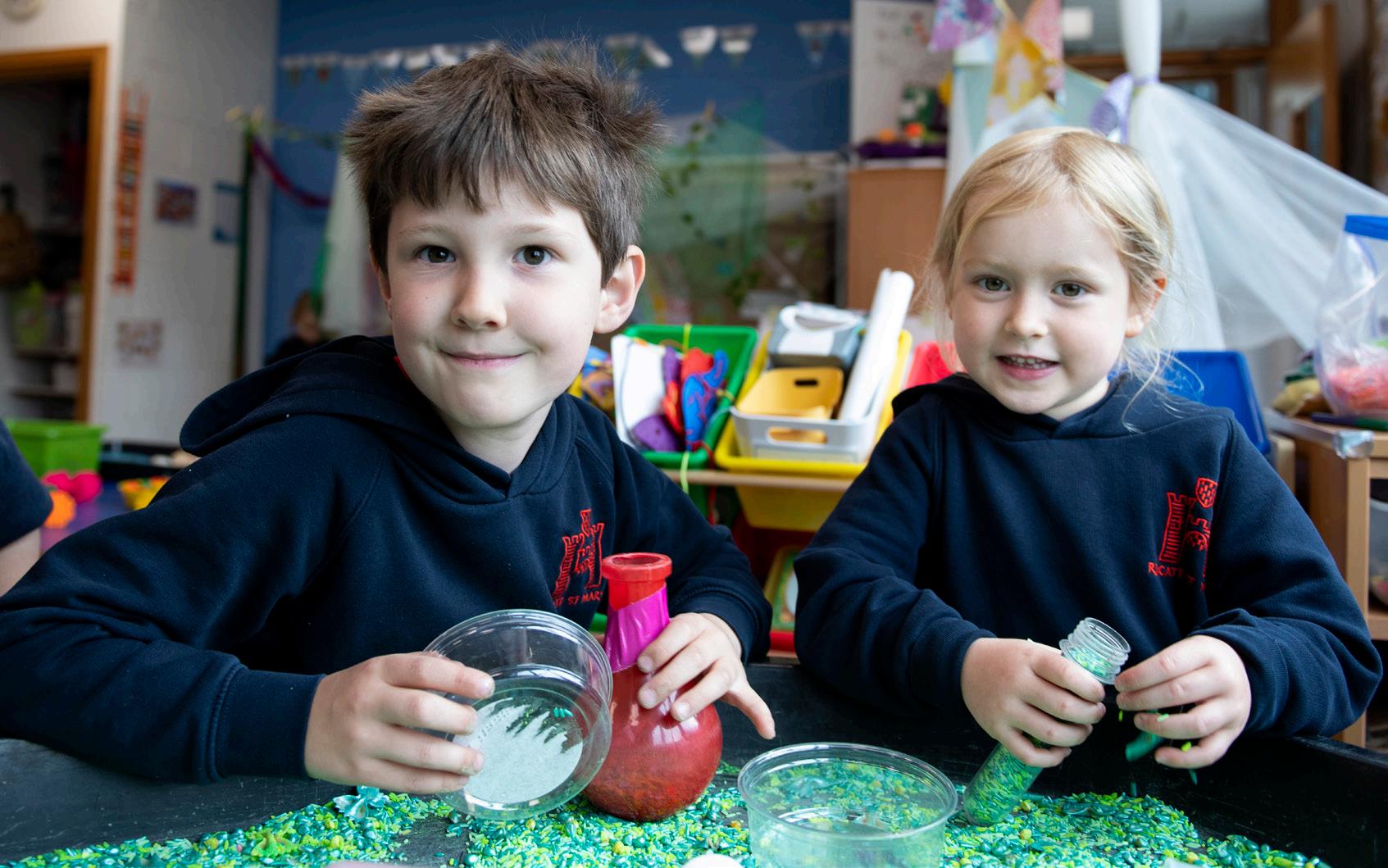
We use the Zones of Regulation framework across the whole school which teaches children how to recognise and understand their emotions and gives them the tools to self-regulate when necessary
Skills learnt at this early stage, help children to manage and talk about their feelings as they mature.
Throughout the school, circle time is an important part of our wellbeing programme. The children know that they can always talk about worries and discuss any issues in a kind and caring space.
Reception, Year 1 and Year 2 children are part of the whole school House system, which fosters relationships between the children across year groups and enhances the sense of belonging to the school community. We have a wellbeing hub and trained Emotional Literacy Support Assistants (ELSA) staff who can provide extra support, if needed.
“Warm relationships are modelled by committed teachers who have established an effective collaborative culture across the school that fully engages pupils.”
ISI Inspection Report 2023
HOME / SCHOOL PARTNERSHIP
Meaningful partnerships with families are a vital part of looking after the overall wellbeing of each child and we begin to build these even before a child joins us.
The process continues when children start school and we make sure we are always available at drop off and pick up to chat through any issues of the day, if necessary. There are regular online year group updates and Microsoft Teams Q&As to give parents a chance to find out more about their child’s learning. We operate an open-door policy and the team are also available by telephone to discuss matters in more detail. Regular parents’ evenings provide a more detailed review of your child’s progress. This is a journey we are on together!
Parents have plenty of opportunity to celebrate their children’s achievements and share in their learning with regular open classrooms. We also love to welcome parents to sports days, the Christmas show, end of year celebration events, Church services and other special days so they can be part of their children’s school life.
Reception teachers use our secure online learning journal, Tapestry, to build a record of each child using photos, videos and diary entries. You can view their progress and leave comments or upload your own files to the journal, so a complete picture of your child’s development is built.
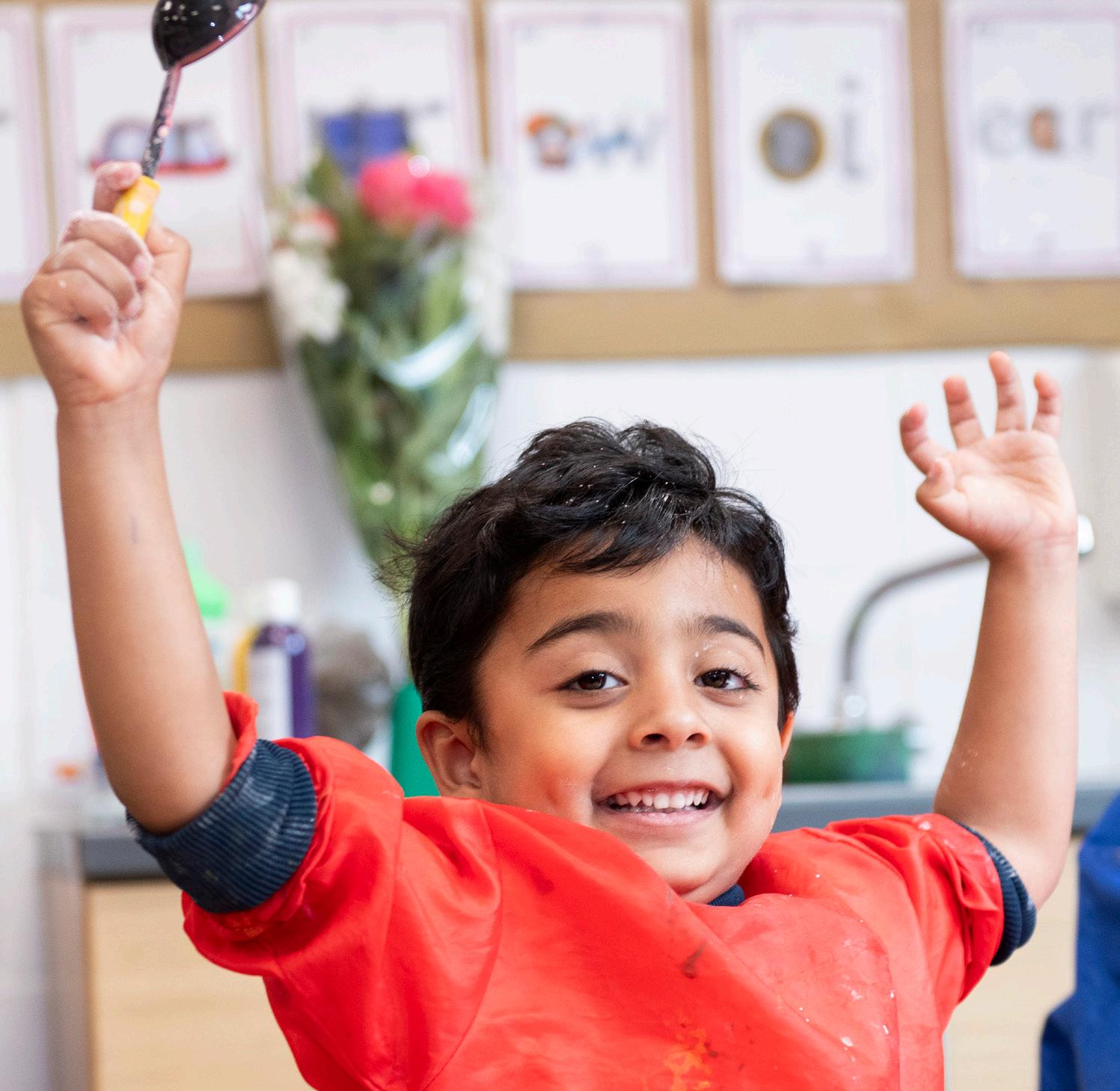
“It is important that
we work as a team for your child so that they can grow and become the best that they can be.”
Year 1 Teacher
“Communication and trust between the parent, child and school is fundamental. We encourage parents to let us know if their child has had any small issues or upset at home, so we can give them extra care and support when they come to school the following day. Equally, if parents have any concerns, no matter how small, we find that a timely one-to-one chat is the best way to dispel worries.”
Sam Selkirk, Head of Lower School
CURRICULUM IN LOWER SCHOOL
The Reception curriculum is based on the final phase of the Early Years Foundation Stage (EYFS) (which is taught from Green Shoots upwards at RSM). When the children move up to Years 1&2, the curriculum transitions to the National Curriculum Framework (and this is also known as Key Stage 1). As an independent school, we further design and develop both curriculums to add breadth and creativity and to reflect the unique ethos of RSM.
RECEPTION – EYFS CURRICULUM
In Reception, there is a careful mix of adult-led and child-initiated purposeful play, structured activities and experiences. Exciting and creative lessons teach the children specific concepts, knowledge and skills and small class sizes enable highly individualised learning for each child as the pace of learning increases. There is plenty of free flow between the indoor and outdoor Reception areas, and teachers take full advantage of the school’s wonderful grounds to deliver lessons outside, whenever possible.
The children’s Early Years scores are exceptional, and they move on to Year 1 with a strong foundation on which to build their learning and the confidence to embrace the challenges of Key Stage 1.

YEAR 1&2 CURRICULUM
Children seamlessly transition from an EYFS-based curriculum to National Curriculum Framework-based learning under the expert guidance of teachers and teaching assistants. Lessons become slightly longer but variety and movement are still in plentiful supply throughout the day.
“When children join Reception, they are at different stages of development, which is sometimes reflected by their age in the year. By taking a child-centric approach, we make sure that activities are appropriate for each individual’s age and stage.”
Reception Teacher
The balance of activities in Year 1 shifts gradually from predominantly child-initiated towards more adult-led tasks, with emotional wellbeing remaining the top priority. The children enjoy an increasingly broad and deep learning experience and the number of extracurricular activities available increases.
Throughout Lower School the children gain the skills and confidence to question and challenge, take risks and to persevere, whether a task comes naturally or requires more effort.
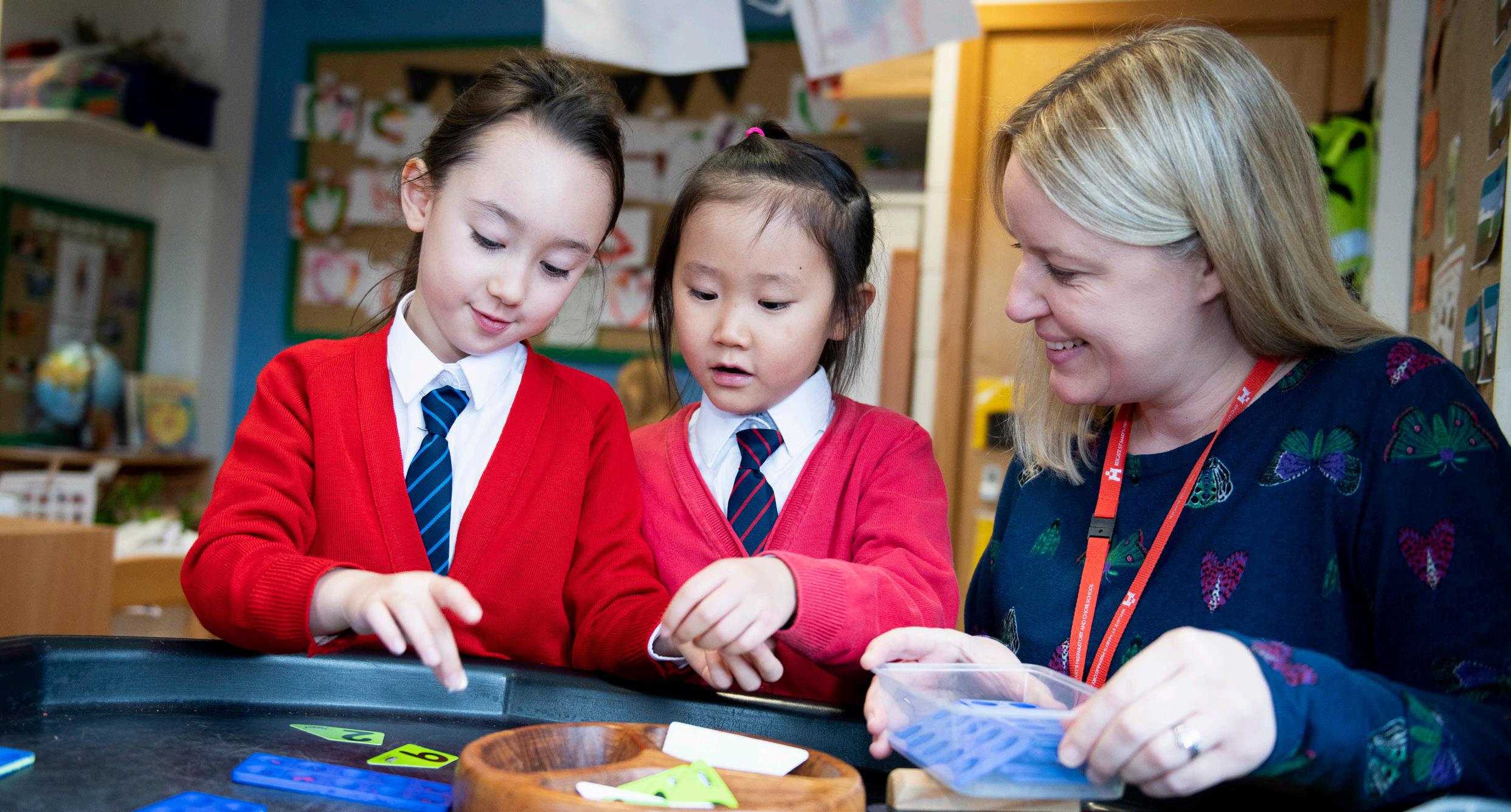
“Children who receive the right sort of support and encouragement during their early years will be creative and adventurous learners throughout their lives.”
Foundation Stage Forum
TOPIC-BASED LEARNING
Throughout Lower School, the children enjoy topic-based learning in creative and exciting lessons across all curriculum subjects. This approach helps them to gain a deeper understanding by allowing them to transfer what they have learnt from one subject on to the next. They are encouraged to bring personal experiences related to their topic to school and are given the opportunity to present to the class which extends their learning further.
When the children study a topic, such as the Celts, they will explore linked books in English to discover facts, write imaginary journals, or complete themed comprehension tasks, undertake Celticthemed activities in science, history and geography lessons and add extra Celtic fun to their Forest School sessions. The children particularly enjoy wearing face paint to become true Celts.
MATHS
In Lower School, we take a mastery approach to mathematical learning. Based on the research of educational theorists, maths mastery first gained popularity in Singapore where pupils rank amongst the highest in worldwide education. The mastery approach makes maths intuitive for all learners. It helps pupils build a strong foundation of skills that will take them right through to senior school and into a future workplace.
Mastering maths means pupils acquiring a deep, long-term, secure and adaptable understanding of the subject. Achieving mastery means acquiring a solid enough understanding of the maths that has been taught to enable them to move on to more advanced material.
In Reception, mathematical fluency is developed by teaching the children to subitise, which requires them to understand a number rather than just recognising the numeral or counting by rote. Early reasoning skills are honed by asking the children to explain their thinking and how they have solved a maths problem.
The children might be asked to spot an incorrect sequence such as 1, 2, 3, 4, 6, 5, 7, 8, 9, 10 and then explain how they knew it was wrong. We use true and false statements like ‘adding 1 to a number always makes it smaller.’
There is a focus on problem solving and the children use their maths skills in lots of contexts and in situations that are new to them. They seek solutions, spot patterns and think about the best way to do things rather than simply following maths procedures.
Finding different ways to split numbers requires the children to problem solve. They could be asked to think of different ways to split the number 5 (5+0, 4+1, 3+2, etc).
Teachers are able to provide a highly differentiated learning experience for each child and support or stretch when appropriate.

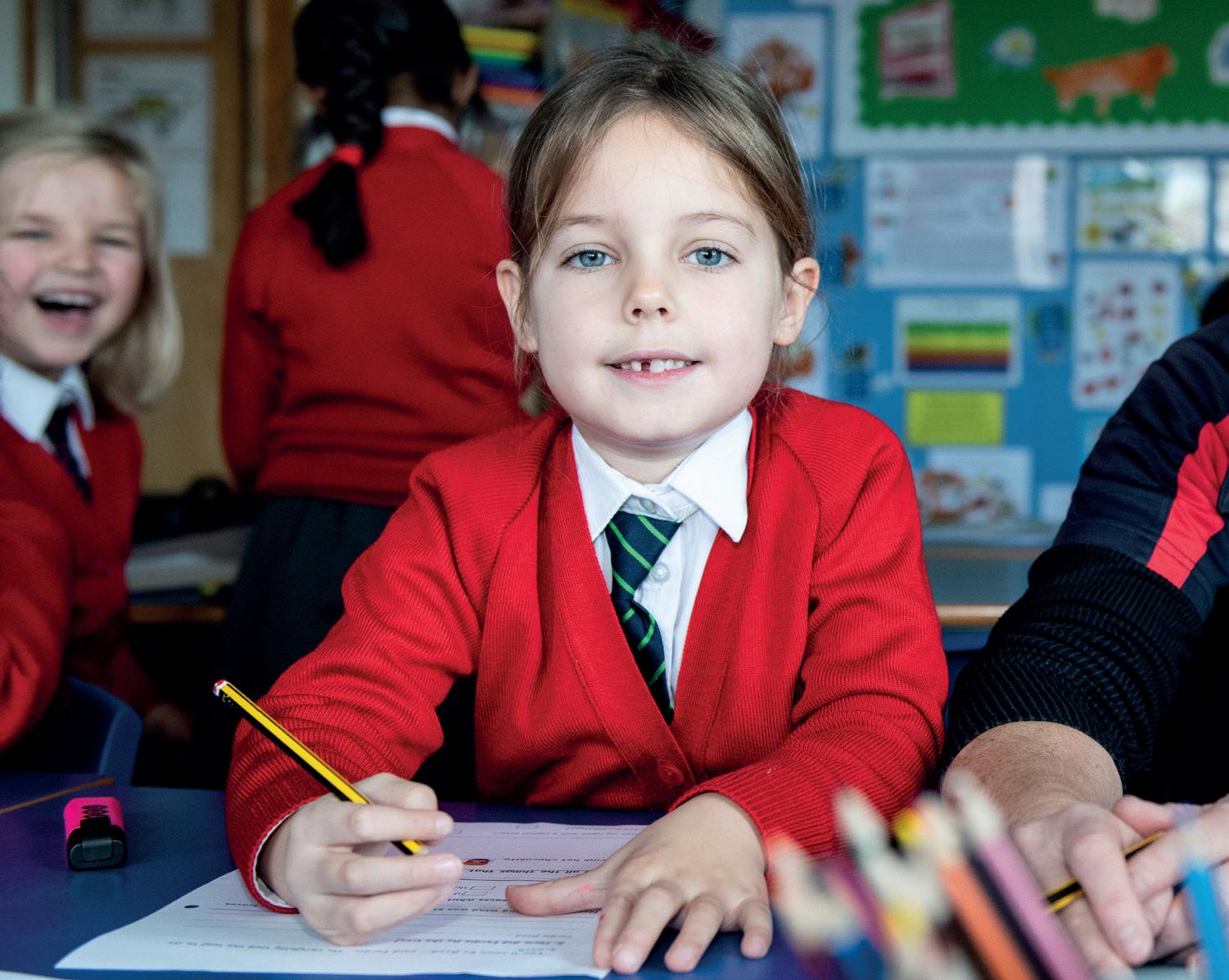
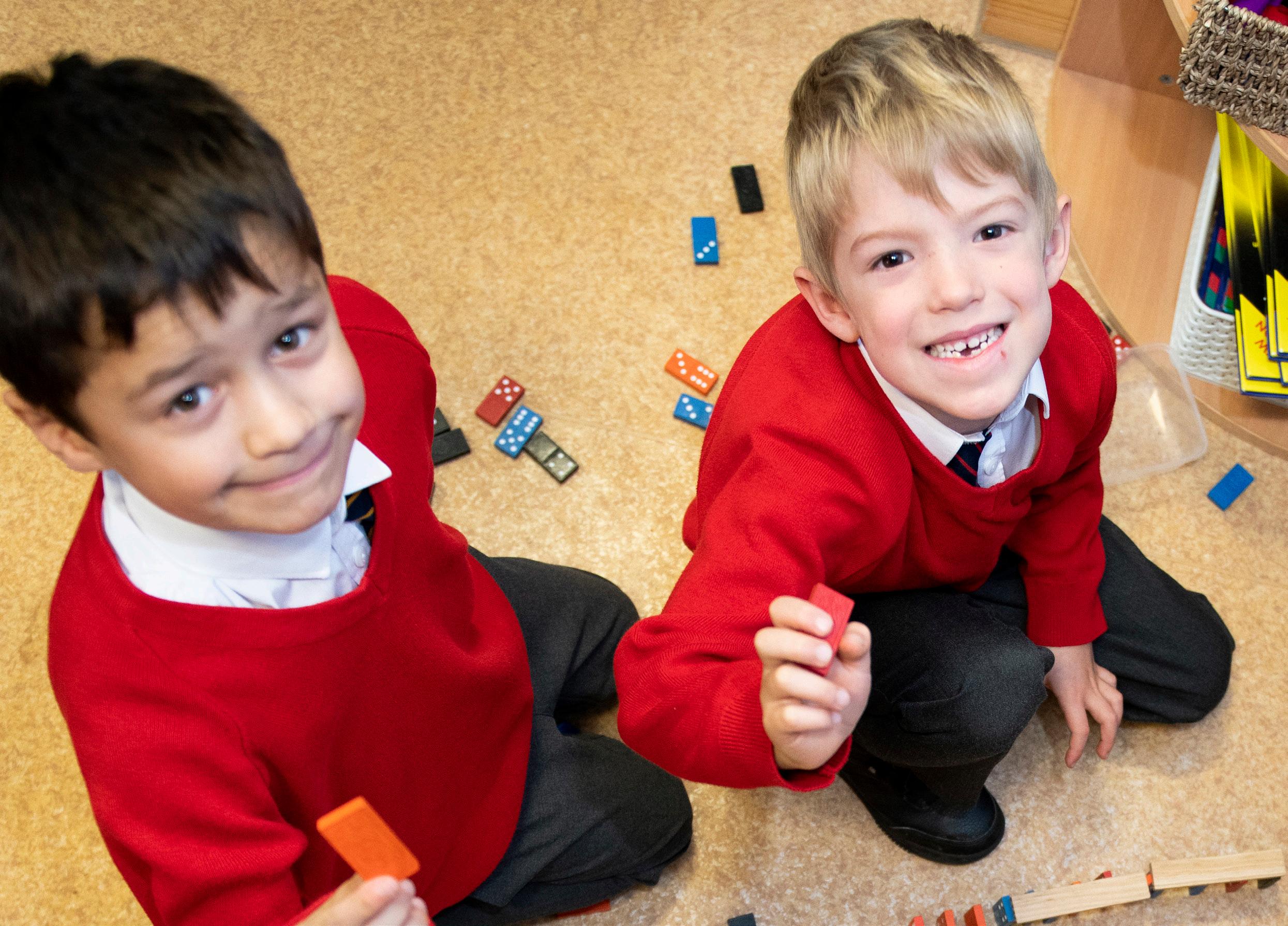
Throughout Lower School, the Concrete Pictorial and Abstract method of teaching helps the children gain a deep understanding of maths. Using toys, counters or twigs (the concrete stage), the children will first group these into sets of three or subtract them from each other. They then progress to using pictures, (they look and see a picture of 15 fish and group together another fish to make 16 fish) followed by the abstract stage, (15+1=16).
In Years 1&2 the children are extended to reach maths mastery through more in-depth questioning. They are encouraged to test their understanding by applying it to word-based problems. They will be asked questions like: Can they explain their method? Can they use a different method? Can they make up one of their own problems using this concept? What would happen if the numbers were...? Can you predict...? What do you notice...? Will it always occur like this, sometimes or never...?
By the end of Year 2, the children have developed a secure and deep understanding of mathematical concepts and are confident to question and problem solve in readiness for the Key Stage 2 curriculum in Upper School.
“It is vital that we develop problem solvers rather than arithmetic robots. Thinkers, not calculators.”
Lower School Teacher
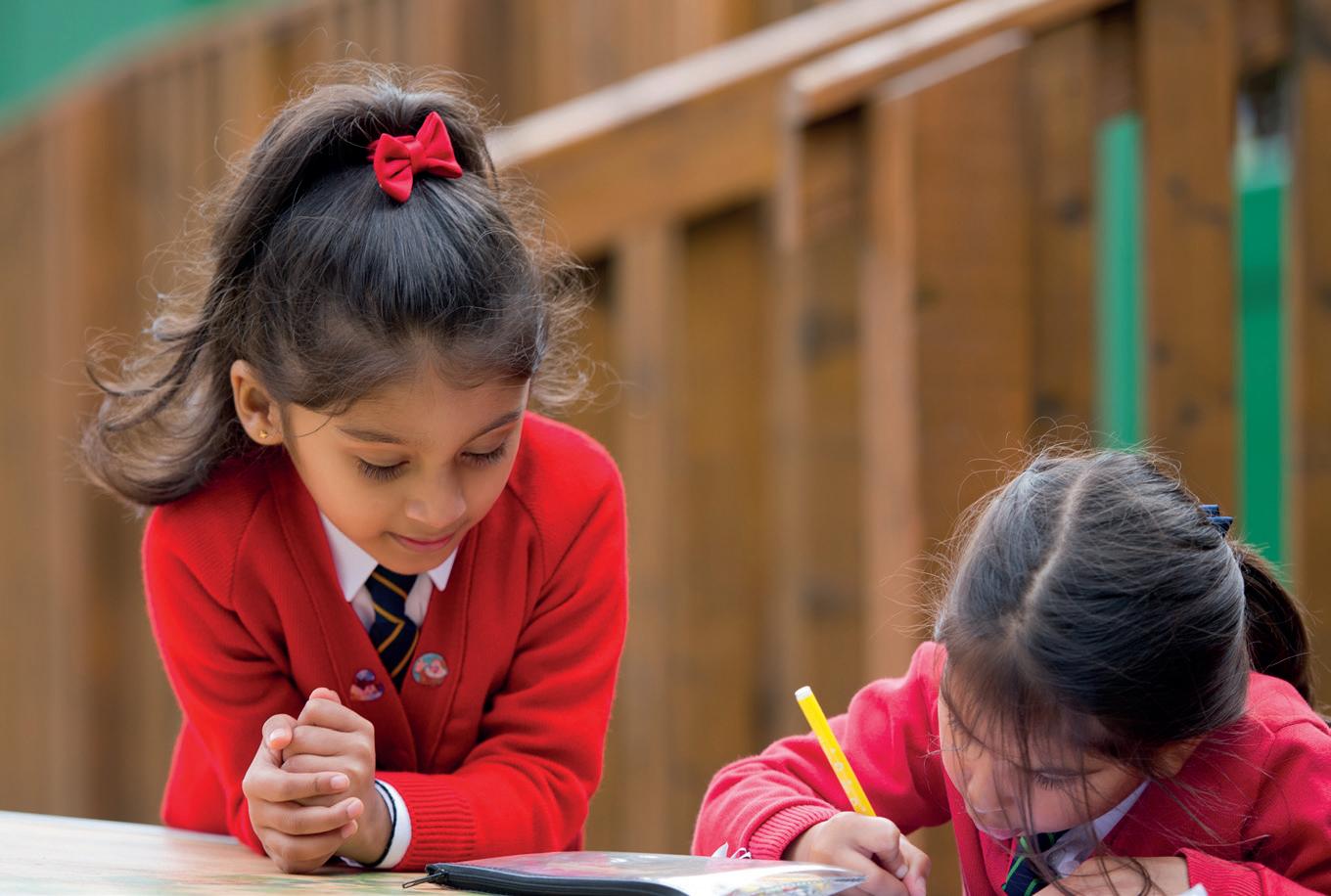
“Children are encouraged to ‘think outside the box’ in English and philosophy empowering them to contemplate and discuss issues meaningfully with their peers.”
ISI Inspection Report 2023
In Reception, favourite nursery rhymes and stories are used to engage the children and encourage them to ask and answer questions. Teachers often draw on their knowledge of what an individual child is particularly interested in, to ignite their curiosity and encourage their communication and language skills.
The physical development of all the children is encouraged in every activity undertaken. This is a crucial time for honing gross- and fine-motor skills, which are essential precursors of writing. Funky Finger sessions help develop writing strength in preparation for fluent writing.
Writing does not have to be with a pencil. We encourage mark making of any kind and we provide lots of opportunities for the children to have fun writing in sand, mud, shaving foam or chalk on the playground. The children write lists, notes, letters, messages and later on, sentences and short stories.
Phonics sessions are always enjoyable and interactive as the children learn to differentiate sounds, blend them and have fun with alliteration. As their reading gathers pace, they use picture clues to help decode unfamiliar words across a range of genres. At RSM we love books! Weekly library lessons are always keenly anticipated.
Structured adult-led phonics sessions in Reception and throughout Lower School accelerate the pace of learning and teachers listen to children’s reading regularly to monitor progress and ensure individual support.
Throughout Lower School, the children read at their own pace and there is continual assessment to ensure stretch or support when needed. If (and only if!) the children are ready and can securely segment and blend basic words, they move on to picture books to develop their reading.
As the children move up to Years 1&2, there is plenty of consolidation of their existing phonics knowledge and a gradual transition to the next stages of the phonics framework as reading fluency increases. There is an emphasis on reading for understanding and the all-important key comprehension skills. Drama is used to stimulate the children’s imaginations and we encourage them to discuss what they have read. As handwriting develops, the children love to write stories and poetry, and they generate ideas for useful word banks. In Year 2, there is a greater focus on editing and improving their work to make it even better.
THE WIDER CURRICULUM
FOREST SCHOOL & OUR WONDERFUL GROUNDS
Reigate St Mary’s is set in 15 acres of grounds with plenty of room for the children to run around, build dens, roll down hills and have adventures. All year round, good use is made of the playgrounds, nature reserve, EDEN area (for quiet time), vegetable patches and pond. Outdoor learning is an integral part of life here for all of our year groups.
Lower School children spend as much time as possible in the fresh air. Reception have their own playground with a trim trail and climbing equipment and they are often outside painting, playing with foam and exploring. All of Lower School make full use of the rest of the grounds too. Tadpole hunting in the pond is a favourite activity!
The children have timetabled Forest School sessions in a special Forest School area in a secluded part of the school grounds. Forest School fosters independence, resilience, confidence, problem solving and creativity and the children’s progress and development is closely monitored by our highly trained practitioners.
Forest School hugely enhances fine and gross-motor skills; before children even begin to write they should be able to explore pushing, climbing, squeezing and developing in a range of environments and materials to build the strong foundations and stamina for writing and more formal learning.
Forest School also supports our school focus on developing Characteristics of Effective Learning and enhances classroom activities.
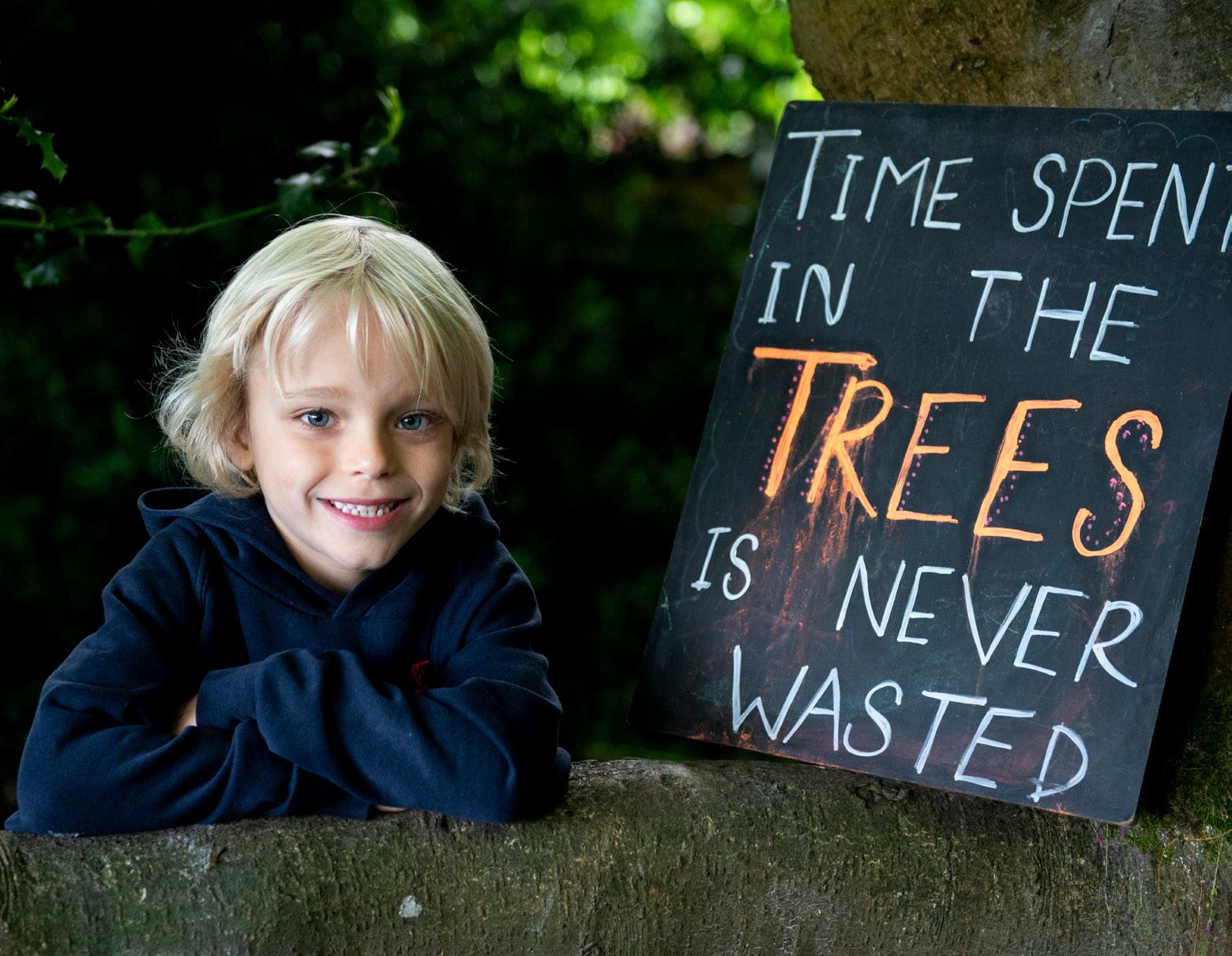
“Many a time I have observed children do something outside that they had yet to achieve inside. That sense of space for many young children is key.”
Sam Selkirk
“The school’s provision of access to a varied outdoor environment enables pupils to be inspired by the wonders of the natural world”
ISI inspection Report 2023
“Lower School classes use the Forest School area at least once a week and the outdoor classroom almost daily. Outdoor learning is hugely important as it fully engages the children. There aren’t many indoor lessons that can’t be taught outside in a relevant, practical and exciting way.”
Miss Buick, Forest School Practitioner

‘Pupils show a high level of information and communication technology skills.”
ISI Inspection Report 2023
INTEGRATED TECHNOLOGY & STEAM
A recent study at Oxford found that the job opportunities that exist today may well be replaced by automation in the next 20 years. It is therefore essential that children can communicate, create, store and manage information and develop robust coding and robotics skills. This can be achieved through well-planned integration of Information Communication Technology (ICT) in all areas of their learning using a diverse set of ICT tools and a well-developed coding curriculum.
At RSM, classrooms are exciting and inspiring places where the children use technology to explore. Microscopes and colourful light boxes aid enquiry and investigation. Voices are recorded on recordable whiteboards and EasiSpeak microphones in preparation for writing or performance. Digital cameras allow work to be captured and shared on large interactive whiteboards by utilising AirServer. ‘Botley’ and the ‘Code-a-pillar’ introduce the children to the first steps of coding.
The technology curriculum boosts creativity, language and intellectual skills as well as fostering social interaction, curiosity and independent learning. It helps to develop higher order thinking skills and provides the children with individualised options to express their understanding.
STEAM stands for science, technology, engineering and maths, and teaching focuses on bringing together elements from each field in order to help children think about how to solve real-world problems. In Lower School, exciting STEAM activities help children to think outside the box.
Using the story of the Three Little Pigs, the children are tasked with using recyclable materials to make a house that is strong enough so that a wolf cannot blow it down. Teachers promote critical thinking through a series of questions and the children are encouraged to test their houses, using a fan or hairdryer perhaps, and revise their model if need be.
SPANISH
Throughout the school, children have weekly Spanish lessons with native Spanish speaker, Miss Maria. She is passionate about developing a love of the Spanish language and culture and the children participate enthusiastically in exciting and engaging lessons.
Reception enjoy Spanish songs, games and rhymes based around specific themes such as jungle animals, colours, numbers up to 10 or days of the week. In Years 1&2, the children continue to focus on listening and speaking as well as the introduction of writing skills, grammatical rules and Spanish phonics.
EDUCATION FOR SOCIAL RESPONSIBILITY
Throughout RSM we have an Education for Social Responsibility (ESR) curriculum woven into the children’s learning. ESR helps children to think about the core values that will lead to happy and fulfilled lives, within stable and caring communities while protecting the planet for the future. At the heart of it, is a focus on the wellbeing of each of them individually, the wellbeing of teams they will work within and the wellbeing of the planet.
Lower School children participate in whole school charity days. We have established a link with a local old people’s home and are looking forward to regular visits from residents to enable the children to develop relationships with them over stories and play.
Lessons include a focus on ESR and from Reception upwards, the children take part in discussions about issues such as the importance of being kind to others.
We are an Eco School with Green Flag status and sustainability issues are taken seriously and are embedded in the children’s topic work. Discussions about not wasting resources, the importance of recycling and looking after things occur on a daily basis and are also tackled when matters arise. An annual ESR focus day brings everyone together and the children love learning about the environment in lessons around the school grounds and at Forest School.
Philosophy 4 Children (P4C) aims to give children deeper shared and reflective thinking skills for life and is taught throughout the school. It enhances thinking and communication skills, boosts self-esteem, and improves academic attainment. It is an integral part of ESR.
In Reception, Year 1and Year 2, short activities are used to engage children and to begin to open them up to the world of philosophical questioning. It is important that the children become used to listening to issues then giving and hearing reasons and agreeing or disagreeing with different viewpoints.
“The children particularly enjoy using the Spanish puppets, which help to bring language learning to life.”
Miss Maria, Spanish Teacher
In Lower School, a P4C lesson may involve Choice v Not a Choice. The teacher gives the children a range of different ideas and the children must explain why they think it is either a choice or not a choice.
GAMES & PE
From Reception upwards, the children are taught PE and games by our experienced sports staff.
Children in Reception have three physical education lessons each week:
• PE – develops fundamental movement skills by exploring locomotion skills and balance through gymnastics, dance and athletic activities;
• Games – the children explore and learn generic skills using a range of balls and equipment in different games and challenges;
• Swimming – develops water confidence and skills.
Children in Years 1&2 have two physical education lessons each week taught by our experienced sports staff:
• PE – fundamental movement skills and further develop locomotion and balance skills via gymnastics, dance and athletic type activities. There is a focus on running, jumping and throwing in Year 2;
• Games – object control using a range of equipment in different challenges and working in pairs and small groups. In Year 2, all children learn hockey, football, netball, rugby and cricket skills, which give them the foundations for games when moving into the Upper School.
• Swimming – In Year 1, children also have an additional swimming lesson for two terms. In Year 2, the children swim for one term. They develop water confidence and stroke technique.

The children enjoy putting their skills into practice at the annual House sports day when they have the opportunity to enjoy a morning of fun competition with their friends.
HOBSON
OSMOND
SEARLE
MALCOLMSON
MUSIC
Music is embedded in the school’s history and is an important part of the curriculum across all age groups. All children in the school have weekly music lessons from a specialist teacher and weekly song practice. Children develop general musicianship skills largely based on the Kodály methodology. The voice is used as the principal instrument with folk songs and rhymes being the emphasis of the lessons. Children develop skills in beat keeping, simple rhythm work, developing the aural memory, an awareness of pitch and other musical concepts through simple games. These musicianship classes serve as a firm foundation for whole class music making, listening to music and simple composition work.
Instruments – We have a thriving individual instrumental and vocal programme and offer tuition in most instruments. The peripatetic teaching team have vast experience and undertake professional work in addition to their teaching.
Choirs and Ensembles – There is a Lower School band for children who play instruments and keen singers can join our Lower School choir, which is open to all children in Reception, Year 1 and Year 2.
Performances – The children enjoy performing throughout the year and the choir regularly performs at local music festivals.
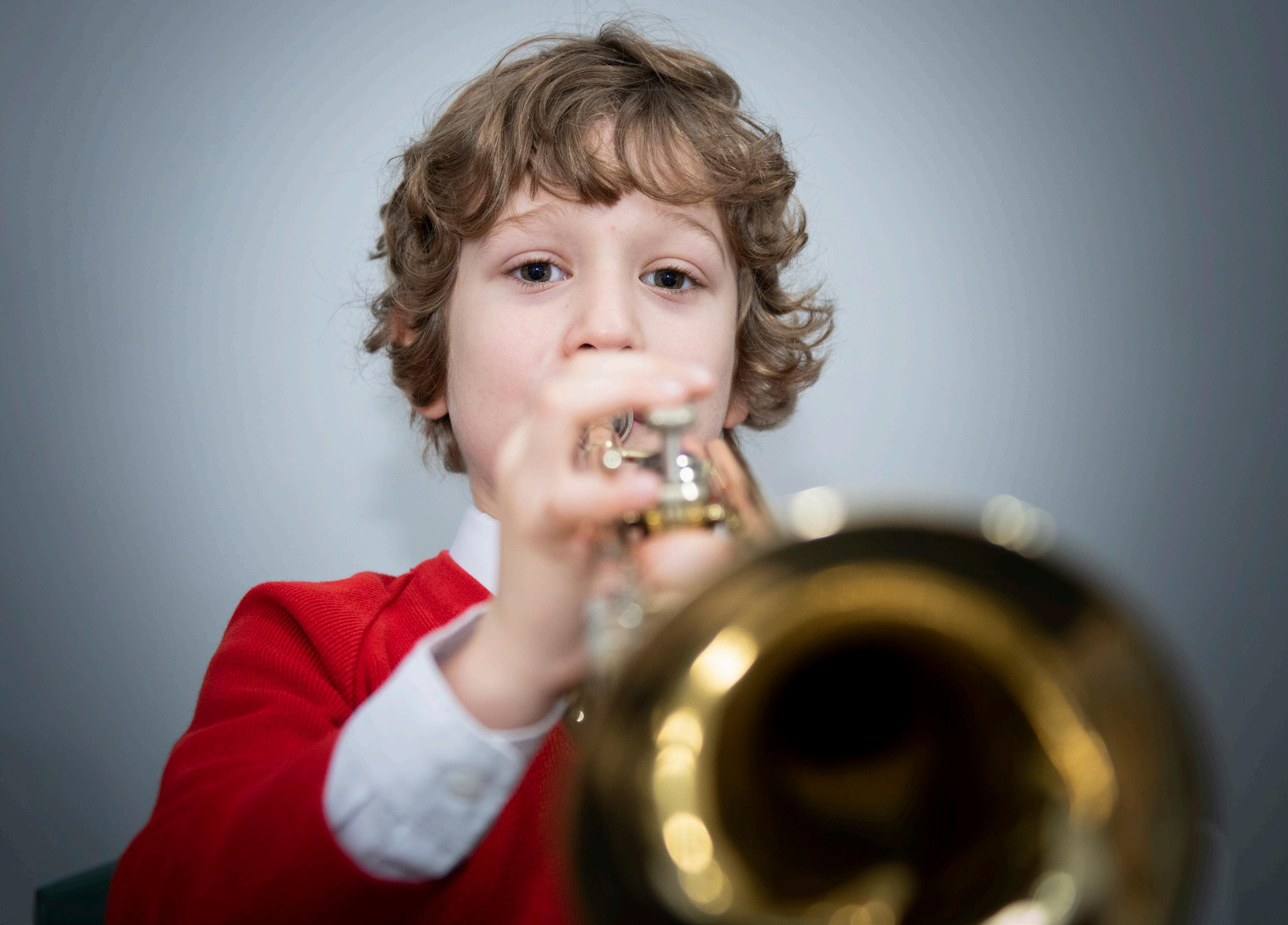
EXTRACURRICULAR, WRAPAROUND CARE & HOLIDAY CLUBS
EXTRACURRICULAR
Across the school there is a rich and varied extracurricular programme with 70+ clubs on offer weekly. These vary by term; a typical example of Lower School clubs is below:
Lunch Time Ballet KG
After School Lower School Band Years 1&2
Chess Year 1&2
Tennis Years 1&2
Athletix Kids Reception
LAMDA Year 1 Art Reception
Lower School Choir Years 1&2
Mini Crickets Kindergarten & Reception
Modern Dance Year 2
Board Games Year 1
Construction Club Year 1
LAMDA Year 2
Musical Theatre Years 1&2
Nature Club Year 2
Pro Direct Years 1-2
WRAPAROUND CARE (48 WEEKS OF THE YEAR)
Term Time – during the school term, children come to Breakfast Club from 7:30am and can stay for After School Club. A hot tea is available and parents can collect at any time up to 6.00pm. There are plenty of fun activities and also quieter times to read stories and for the children to have some rest time, if needed. The environment is designed to feel like a home-from-home and the children play with friends and talk about their day in a relaxed atmosphere.
Holiday Clubs – our own RSM
Holiday Club runs for part of the school holidays for children in Reception upwards (we have a separate holiday club for our younger children). There is an exciting programme of activities run by a team of RSM staff and it is always extremely popular.
Camp Beaumont runs camps during other weeks of the holidays. It is the UK’s most established day-camp provider and has been successfully providing fun and engaging holiday care for over 40 years.
Mini Crickets Years 1&2
Pro Direct Kindergarten & Reception
LAMDA Year 1
Playball Year 1
Judo Years 1&2
Karate Years 1&2
Ballet Reception
Ballet Years 1&2
Tap Dance Year 2
Playball Year 1
There are wraparound care spaces available for everyone and a booking system, via a bespoke app, that gives parents the flexibility to confirm sessions well in advance or right up to the evening before.
THE RSM COMMUNITY
Our wonderful Friends of St Mary’s Association (FOSMA for short) raises funds in order to provide our pupils with memorable experiences such as termly discos and visits from the Easter bunny or Santa and his elves. Events organised by FOSMA include our famous annual fireworks extravaganza, and the Summer and Christmas fairs. Funds have also been raised for specific equipment around the school, from our Wellbeing Room to our climbing fort.
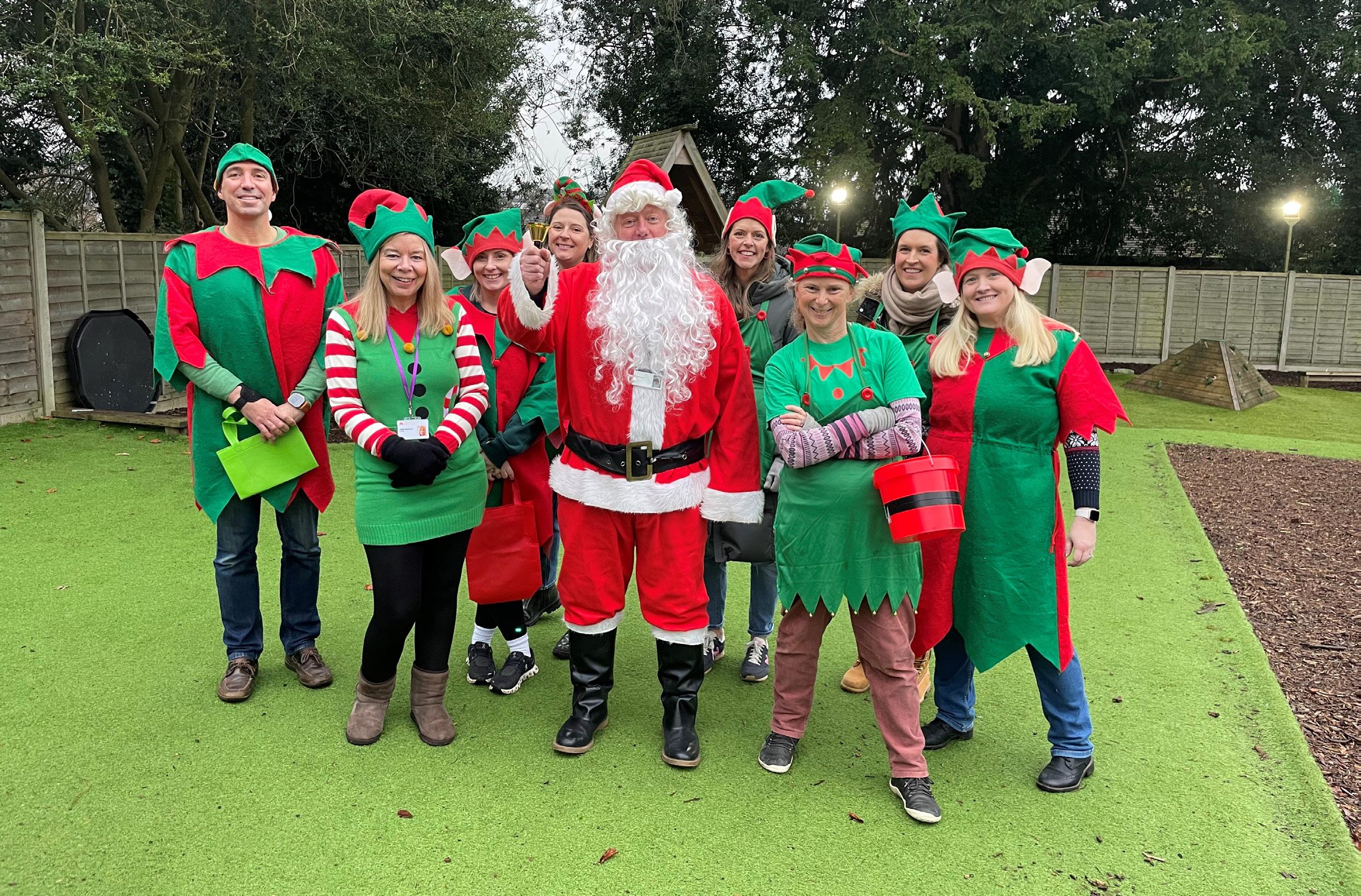
“Collaborative learning contributes strongly to their holistic personal development.”
ISI Inspection Report 2023
WHAT DOES THE SCHOOL DAY LOOK LIKE? RECEPTION EXAMPLE
initiated learning/ Enhanced provision
Child Initiated Learning CLthese periods represent times when the EYFS (Early Years Foundation Stage) Curriculum is being delivered through a careful mix of adult-led and child-initiated purposeful play, structured activities and experiences. These are carefully designed to teach specific concepts, knowledge and skills, based on the children’s individual needs.
Enhanced Provision EPthis can be either English or Maths or both. Children are set specific tasks or challenges to reinforce their learning from the previous week.
Prime Areas of the EYFS Curriculum: Personal, Social & Emotional Development; Physical Development; Communication & Language. Specific Areas of the EYFS Curriculum: Literacy; Mathematics; Understanding The World; Expressive Arts & Design.
WHAT DOES THE SCHOOL DAY LOOK LIKE? YEAR
WHAT DOES THE SCHOOL DAY LOOK LIKE? YEAR 2 EXAMPLE
“My daughter has rocketed her way through the year, loving her learning, her playtimes, her sport, the fun and commitment of her teachers as well as her budding friendships. She can’t wait to move up to her new class in September.”
Year 2 Parent
Reigate St Mary’s, Chart Lane, Reigate, Surrey RH2 7RN 01737 244 880
reigatestmarys.org
facebook.com/ReigateStMarys
@rsmprepschool
